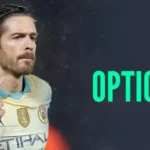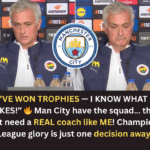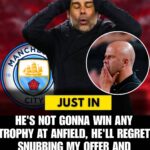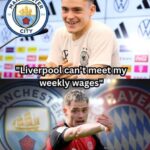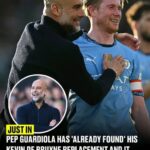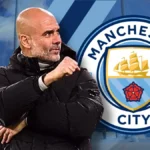Pep Guardiola’s job at risk?! Man City urged to bring in ‘manager who lights a fire in players’ after Florian Wirtz snub

The gleaming towers of Manchester’s Etihad Stadium have witnessed unprecedented success over the past seven years, but as the summer of 2025 unfolds, questions about Pep Guardiola’s future at Manchester City have reached a crescendo. The Catalan mastermind, who transformed City into the most dominant force in English football, now finds himself at the center of a debate that seemed unthinkable just two years ago. The catalyst for this discussion isn’t just one disappointing season, but a series of events that have led former Liverpool midfielder Didi Hamann to make the bold suggestion that City should part ways with their trophy-laden manager.
The most telling moment came when Bayer Leverkusen’s rising star Florian Wirtz reportedly asked Guardiola about his long-term commitment to the club during transfer negotiations. When the manager couldn’t provide the assurance the young German was seeking, Wirtz opted to reject City’s advances, leaving the club to pursue alternative targets. This snub has been interpreted by critics as a sign that Guardiola’s influence and appeal may be waning, prompting serious questions about whether the most successful manager in City’s history should continue at the helm.
The Context: A Season of Transition and Disappointment
To understand the current situation, one must examine the 2024-25 season through the lens of Manchester City’s extraordinary standards. For a club that had grown accustomed to collecting silverware with the regularity of a Swiss timepiece, going trophyless represented not just disappointment but a seismic shift in expectations. The season marked City’s worst campaign since 2017, a year that now seems like ancient history given the remarkable success that followed.
The transition began with the departure of several key figures who had been instrumental in City’s golden era. Kevin De Bruyne’s exit as a free agent represented more than just the loss of a world-class midfielder; it symbolized the end of an era. The Belgian maestro had been Guardiola’s on-field conductor, the player who best understood and executed the manager’s complex tactical instructions. His departure left a creative void that proved difficult to fill, despite the club’s significant investment in younger talent.
The recruitment strategy itself became a point of contention. While City’s board demonstrated their commitment to youth by investing heavily in promising players like Tijjani Reijnders from AC Milan, the immediate impact was limited. The integration of young players into Guardiola’s intricate system has always been a gradual process, but with the departure of experienced leaders, the learning curve became steeper and more costly in terms of results.
The Premier League campaign, in particular, highlighted the challenges facing City. Teams that had previously struggled against Guardiola’s tactical innovations began to find ways to neutralize City’s attacking threats. The loss of De Bruyne’s creativity, combined with the aging of other key players, created tactical predictability that opposing managers exploited with increasing success. Arsenal, Liverpool, and even Chelsea found ways to frustrate City’s possession-based approach, leading to dropped points in crucial matches.
The Wirtz Rejection: A Symbolic Moment
The rejection by Florian Wirtz represents more than just a failed transfer; it symbolizes a potential shift in how elite players view Manchester City and Pep Guardiola. The 22-year-old German international had been identified as the perfect replacement for De Bruyne, possessing the technical ability, vision, and tactical intelligence that Guardiola values in his creative players. City’s pursuit of Wirtz was thorough and determined, with the club prepared to meet Bayer Leverkusen’s substantial valuation.
However, when Wirtz and his representatives met with Guardiola to discuss the potential move, the conversation revealed a crucial weakness in City’s position. The young midfielder’s direct question about Guardiola’s long-term commitment exposed the uncertainty that has surrounded the manager’s future since his contract extension. While Guardiola’s honesty in admitting he couldn’t guarantee his long-term presence might be admirable, it proved counterproductive in securing one of Europe’s most sought-after talents.
Wirtz’s decision to decline City’s offer and reportedly favor other destinations highlights how player recruitment has become increasingly complex in the modern game. Elite players, particularly those in the early stages of their careers, seek stability and long-term vision from their potential clubs. The prospect of joining a team only to have the manager depart within a year or two represents a significant risk to their development and career trajectory.
The incident also raises questions about City’s succession planning. While the club has been meticulous in planning for player transitions, the same level of foresight appears to be lacking regarding managerial continuity. This gap became apparent when faced with a direct question from a potential signing about the manager’s commitment, highlighting a vulnerability that rival clubs could exploit in future transfer negotiations.
Hamann’s Critique: The Case for Change
Didi Hamann’s analysis of City’s situation draws from his extensive experience as both a player and observer of the game. His suggestion that City needs “a manager who lights a fire up in the players” reflects a common criticism of Guardiola’s later years at previous clubs. The former Germany international’s reference to Bayern Munich players describing themselves as “exhausted” after Guardiola’s three-year tenure provides historical context for current concerns about player fatigue under the Catalan’s demanding system.
Hamann’s argument centers on the concept of diminishing returns in management. Even the most innovative and successful coaches can reach a point where their methods become predictable, their motivational techniques lose impact, and their tactical innovations are neutralized by opponents who have had years to study and counter them. This natural cycle of managerial effectiveness is something that has affected even the greatest coaches in football history.
The suggestion that City needs “fresh input” acknowledges Guardiola’s extraordinary achievements while recognizing that sustained success at the highest level often requires periodic renewal. Hamann’s perspective reflects a pragmatic view of football management, where even the most successful relationships between clubs and managers must eventually evolve or risk stagnation.
Furthermore, Hamann’s observation about Guardiola’s pattern of staying three years at previous clubs adds weight to his argument. At Barcelona, despite unprecedented success including two Champions League titles, Guardiola left after four years, citing burnout and the need for fresh challenges. His departure from Bayern Munich after three trophyless seasons in the Champions League followed a similar pattern, with reports of player fatigue and tactical staleness.
The Guardiola Legacy: Unprecedented Success
Any discussion of Guardiola’s potential departure must be contextualized within his extraordinary achievements at Manchester City. Since arriving in 2016, the Spanish manager has revolutionized English football, introducing a level of tactical sophistication and technical excellence that has set new standards for the Premier League. His impact extends far beyond the trophy cabinet, impressive though it is, to fundamentally changing how football is played and understood in England.
The statistics of Guardiola’s City tenure read like a fantasy. Eight Premier League titles in nine seasons represent dominance unseen since the early days of Manchester United under Sir Alex Ferguson. The manner of these victories, often achieved with record-breaking points totals and goal differences, demonstrated not just success but complete superiority over domestic competition. The 2017-18 season, in particular, when City became the first team to reach 100 points in a Premier League campaign, showcased football of such quality that it redefined what was possible in English football.
The Champions League triumph in 2023 finally provided the European validation that Guardiola’s City project had long sought. The victory over Inter Milan in Istanbul was the culmination of years of near-misses and painful defeats, representing not just a trophy but the completion of Guardiola’s transformation of City into a truly global football powerhouse. The manner of that victory, achieved through tactical flexibility and mental resilience, demonstrated the evolution of both the manager and his team.
Beyond the trophies, Guardiola’s influence on individual players has been transformative. Players like Raheem Sterling, John Stones, and Ilkay Gundogan reached new heights under his guidance, developing aspects of their game that seemed impossible before his arrival. The way he reimagined Kevin De Bruyne’s role, transforming him from a traditional number 10 into a complete midfielder capable of controlling games from deep positions, exemplified his ability to maximize player potential.
The Challenge of Sustained Excellence
The difficulty of maintaining the standards Guardiola established at City cannot be overstated. When a team consistently wins major trophies and plays football of exceptional quality, the margin for error becomes minimal. Every dropped point is scrutinized, every tactical decision questioned, and every player performance measured against impossibly high standards. This environment, while driving excellence, can also create pressure that becomes counterproductive over time.
The physical and mental demands of Guardiola’s system are well-documented. Players must maintain exceptional fitness levels to execute the high-intensity pressing and constant movement that his tactics require. The tactical complexity demands complete understanding and flawless execution, leaving little room for individual interpretation or creativity outside the system. Over time, these demands can lead to both physical burnout and mental fatigue, as players struggle to maintain the required intensity.
The evolution of opposition tactics has also presented new challenges. When Guardiola first arrived in England, his possession-based approach and positional play concepts were revolutionary. Opponents struggled to cope with City’s tactical innovations, often appearing bewildered by the movement patterns and passing combinations that Guardiola’s teams produced. However, after seven years of studying his methods, Premier League managers have developed increasingly sophisticated approaches to neutralizing City’s strengths.
The emergence of teams like Arsenal under Mikel Arteta, who learned directly from Guardiola, has created tactical mirrors that present unique challenges. When facing teams that employ similar principles of possession football and high pressing, City’s traditional advantages are neutralized, forcing Guardiola to constantly evolve his approach. This tactical arms race has added layers of complexity to every game, making sustained dominance increasingly difficult to achieve.
The Youth Project: Building for the Future
City’s recent focus on youth recruitment represents both an opportunity and a challenge for Guardiola’s future at the club. The signings of players like Tijjani Reijnders demonstrate the club’s commitment to building a sustainable model for long-term success. However, integrating young players into Guardiola’s complex system while maintaining competitive standards presents significant difficulties.
The Dutch midfielder’s arrival from AC Milan exemplifies City’s new recruitment philosophy. At 26, Reijnders brings experience and versatility that should allow for easier integration into Guardiola’s system. His ability to play multiple positions and his understanding of tactical complexity, developed during his time in Serie A, make him an ideal candidate for Guardiola’s positional play concepts. However, replacing the irreplaceable creativity and leadership of Kevin De Bruyne requires more than just tactical understanding.
The broader youth project at City extends beyond individual signings to encompass a philosophical shift in how the club approaches squad building. The academy graduates who have been given increased opportunities reflect Guardiola’s commitment to developing local talent within his tactical framework. Players like Rico Lewis and Oscar Bobb have shown promising development under Guardiola’s guidance, suggesting that the youth integration strategy can succeed.
However, the timeline for this youth development may not align with Guardiola’s personal ambitions. The manager’s history suggests a preference for immediate success rather than long-term projects that require patient development. The tension between short-term competitive demands and long-term squad building could influence his decision-making regarding his future at the club.
Financial Fair Play and Tactical Constraints
The evolving landscape of Financial Fair Play regulations has added another dimension to City’s challenges. The increased scrutiny of club finances and transfer spending has forced City to be more creative in their recruitment strategies. The focus on younger players partly reflects these financial constraints, as clubs seek to maximize value while complying with regulatory requirements.
These limitations have affected Guardiola’s ability to make the marquee signings that previously characterized City’s transfer windows. The failure to secure Wirtz, partly due to the uncertainty around Guardiola’s future, highlights how these constraints can compound other challenges. When clubs cannot guarantee both financial investment and managerial stability, attracting elite talent becomes increasingly difficult.
The tactical implications of these constraints are significant. Guardiola’s system relies heavily on having players who perfectly fit specific roles within his tactical framework. When the club cannot acquire these ideal players due to financial or other constraints, tactical compromises become necessary. These compromises can reduce the effectiveness of the overall system, creating a cycle where reduced performance leads to further recruitment challenges.
The Succession Question
Perhaps the most significant aspect of the current debate is the question of who could potentially replace Guardiola should City decide to make a change. The club’s success has been so closely tied to Guardiola’s methods and philosophy that finding a suitable successor presents enormous challenges. Any replacement would need to maintain the tactical sophistication that City’s players and fans have become accustomed to while bringing fresh ideas to revitalize the team.
Several names have been mentioned in connection with the potential succession, each bringing different qualities and approaches. Mikel Arteta’s success at Arsenal has made him an obvious candidate, given his deep understanding of Guardiola’s methods and his proven ability to implement similar tactical concepts. However, his association with Arsenal would make such a move politically complex and potentially damaging to both clubs.
Other candidates from within the broader Guardiola coaching tree, such as Enzo Maresca or former assistants who have moved into management, could provide continuity while bringing fresh perspectives. The challenge lies in finding someone who can maintain City’s tactical identity while adding new elements that can re-energize both players and supporters.
The timing of any potential change would be crucial. Making such a significant alteration during a period of squad transition could amplify the disruption rather than solve existing problems. However, waiting too long might allow competitive decline to become entrenched, making any eventual recovery more difficult.
Player Perspectives and Squad Dynamics
The impact of prolonged exposure to Guardiola’s intensive methods on the current squad cannot be ignored. Several key players have worked under the manager for multiple seasons, experiencing both the heights of success and the demands of his system. The psychological and physical toll of maintaining such high standards year after year inevitably affects performance and motivation.
Senior players like Erling Haaland, who joined City during the recent period, bring different perspectives on Guardiola’s methods. Their fresh enthusiasm for his tactical concepts can provide temporary boosts to squad energy, but integrating new players while managing the fatigue of long-serving squad members requires delicate handling.
The departure of influential figures like Kevin De Bruyne has shifted squad dynamics in ways that extend beyond tactical considerations. De Bruyne’s role as a bridge between Guardiola’s complex instructions and the rest of the squad was invaluable in maintaining team cohesion and understanding. Finding players who can fulfill similar leadership roles while adapting to Guardiola’s demands represents a significant challenge.
The younger players entering the squad bring energy and ambition but lack the experience of winning major trophies under pressure. This generational transition within the squad adds another layer of complexity to Guardiola’s task of maintaining competitive standards while developing future stars.
The Broader Context of Modern Management
The debate surrounding Guardiola’s future at City reflects broader trends in modern football management. The increasing pace of change in the game, driven by tactical evolution, financial pressures, and media scrutiny, has shortened the typical tenure of even successful managers. The days when managers like Sir Alex Ferguson could build sustained dynasties lasting decades appear to be ending.
The globalization of football has also changed player expectations and motivations. Elite players now have unprecedented choice in their career decisions, with multiple top clubs competing for their services. This environment places additional pressure on managers to not only achieve immediate success but also provide assurance about long-term stability and development opportunities.
The role of social media and constant analysis has intensified scrutiny of managerial decisions. Every tactical choice is immediately debated by thousands of analysts and commentators, creating an environment where sustained success becomes increasingly difficult to maintain. This pressure affects not only managers but also players, who must perform under unprecedented levels of public examination.
Conclusion: A Decision Point for City
The question of Pep Guardiola’s future at Manchester City represents more than just a managerial decision; it encapsulates the challenges facing all elite football clubs in maintaining sustained success. The Wirtz rejection and subsequent criticism from figures like Didi Hamann have crystallized concerns that had been building throughout a disappointing season.
Guardiola’s extraordinary achievements at City cannot be disputed. His transformation of the club from ambitious challengers to dominant champions has been remarkable in its scope and consistency. The eight Premier League titles, Champions League triumph, and revolutionizing of English football represent a legacy that will endure regardless of future decisions.
However, the signs of potential decline cannot be ignored. The trophyless season, recruitment difficulties, and questions about player motivation suggest that change may be necessary to revitalize the project. The challenge for City’s leadership lies in determining whether these issues represent temporary setbacks or indicators of deeper structural problems requiring significant change.
The decision ultimately rests on whether City believe Guardiola can rediscover the innovative spark that made his teams unstoppable or whether fresh leadership is needed to guide the club through its next phase of development. Either choice carries significant risks and potential rewards, making this one of the most consequential decisions in the club’s modern history.
As the summer transfer window progresses and pre-season preparations begin, the questions surrounding Guardiola’s future will only intensify. The manager’s own reflections on his tenure, the squad’s response to continued demands, and the club’s ability to attract top talent will all influence the final decision. What remains certain is that Manchester City stands at a crossroads, with the path chosen likely to determine the club’s trajectory for years to come.
The Guardiola era at Manchester City has been extraordinary by any measure, but even the most successful relationships in football must eventually evolve. Whether that evolution involves renewal under the current management or transformation under new leadership will define the next chapter in one of modern football’s most successful stories.
